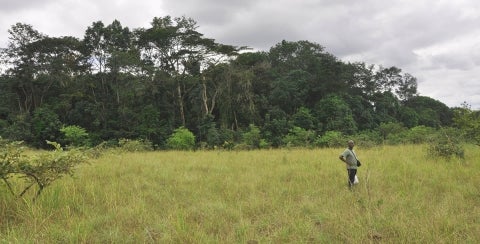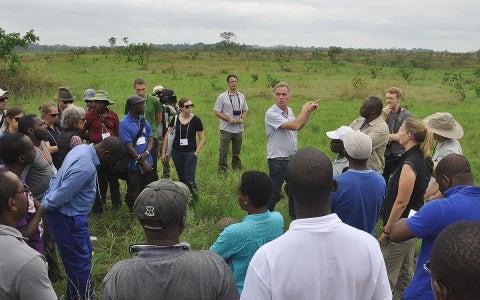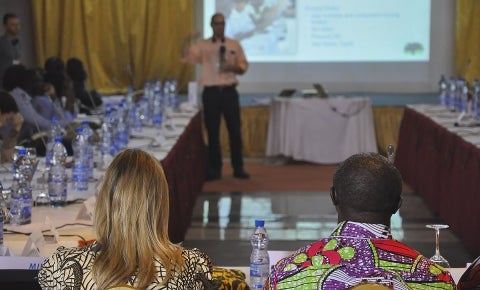Note: Yale School of the Environment (YSE) was formerly known as the Yale School of Forestry & Environmental Studies (F&ES). News articles and events posted prior to July 1, 2020 refer to the School's name at that time.

The Forests Dialogue (TFD), a Yale-based program that promotes multi-stakeholder discussions on forest issues, recently brought together 60 people from 15 countries to discuss how the concept of deforestation-free supply chains could be applied in western and central Africa.
Participants in the five-day event, held in Gabon in mid-October, included organizations working on natural resources, rights and sustainable development, international companies, representatives of ministries from several countries, sustainable land-use experts, and national NGOs. The dialogue followed the Africa Palm Oil Initiative Regional Meeting convened by the Tropical Forest Alliance 2020 in Libreville.
Participants in the five-day event, held in Gabon in mid-October, included organizations working on natural resources, rights and sustainable development, international companies, representatives of ministries from several countries, sustainable land-use experts, and national NGOs. The dialogue followed the Africa Palm Oil Initiative Regional Meeting convened by the Tropical Forest Alliance 2020 in Libreville.
Traveling through planted and protected areas was a key component in understanding our landscape conservation approach.
“The Forests Dialogue’s primary goal for this discussion was to bring together individuals who are working globally to promote, implement and assess deforestation-free commitments with individuals in Gabon who want to understand how these tools and initiatives can be applied or modified for their own land-use planning and management strategies,” said Gary Dunning ’96 M.F., TFD’s executive director.
Created in 1998, The Forests Dialogue promotes ongoing, multi-stakeholder conversation and trust building to resolve forest-related conflicts across the world. Over nearly two decades TFD has convened more than 2,500 leaders to work through compelling, and often thorny, challenges.
The Gabon Dialogue event was held in Mouila, a town in the southwestern part of the country, where the global agri-business, Olam, has a major oil palm project. Participants spent two days in the field, visiting an oil palm nursery and plantation, ecological and cultural conservation areas within the concession, villages neighboring Olam’s development, a smallholder agriculture program called "GRAINE" that Olam has partnered with the Gabonese government to develop, and a Gabonese sawmill and logging operation.
Created in 1998, The Forests Dialogue promotes ongoing, multi-stakeholder conversation and trust building to resolve forest-related conflicts across the world. Over nearly two decades TFD has convened more than 2,500 leaders to work through compelling, and often thorny, challenges.
The Gabon Dialogue event was held in Mouila, a town in the southwestern part of the country, where the global agri-business, Olam, has a major oil palm project. Participants spent two days in the field, visiting an oil palm nursery and plantation, ecological and cultural conservation areas within the concession, villages neighboring Olam’s development, a smallholder agriculture program called "GRAINE" that Olam has partnered with the Gabonese government to develop, and a Gabonese sawmill and logging operation.

“It was a great opportunity for Olam to have people from all over the world to physically experience the palm development model proposed by the company,” said Quentin Meunier, Head of Environment and Sustainable Development in Gabon for Olam. “Traveling through planted and protected areas was a key component in understanding our landscape conservation approach.”
After washing off the dust and dirt, the diverse group gathered around a table to discuss what they had seen. Their conversations touched on the challenges of achieving sustainable development in a country that has uniquely high forest cover and a strong need for economic development for a growing population.
“The concept of zero deforestation is a challenge for Gabon: how to preserve forest ecosystems and biodiversity, while developing at the agricultural level to feed its population and reduce the import bill for a country with a forest cover of 88 percent,” said Patrick Mounguengui, from the Ministry of Agriculture in Gabon.
Discussions at the end of the event focused on potential solutions to address these challenges. Edwige Eyang Effa, from the group Women for Environment, Health and Education in Gabon, voiced the need for compromise within these solutions. “We cannot make the protection of our forests a tool of inequalities that will make the communities living there more vulnerable,” she said.
Participants proposed practical action points that they could take on themselves, either within their own organizations or in collaboration with individuals that they met during the meeting. “Many stakeholders from Central Africa perceived ‘deforestation-free’ as a notion imposed from far away,” said Rod Taylor of the World Resources Institute. “The Dialogue identified a critical need for follow-up actions to support local stakeholders to articulate their vision for development and how this can leverage global momentum towards responsible supply chains.”
While the participants dispersed after five days the discussion is far from over. As individuals return to their respective cities, countries, and workplaces, there is much anticipation amongst the participants, who plan to follow up on the many good ideas with action.
The direct outputs from the Dialogue are the background paper and the co-chair summary. Vew the summary here | Read more at the TFD web site.
After washing off the dust and dirt, the diverse group gathered around a table to discuss what they had seen. Their conversations touched on the challenges of achieving sustainable development in a country that has uniquely high forest cover and a strong need for economic development for a growing population.
“The concept of zero deforestation is a challenge for Gabon: how to preserve forest ecosystems and biodiversity, while developing at the agricultural level to feed its population and reduce the import bill for a country with a forest cover of 88 percent,” said Patrick Mounguengui, from the Ministry of Agriculture in Gabon.
Discussions at the end of the event focused on potential solutions to address these challenges. Edwige Eyang Effa, from the group Women for Environment, Health and Education in Gabon, voiced the need for compromise within these solutions. “We cannot make the protection of our forests a tool of inequalities that will make the communities living there more vulnerable,” she said.
Participants proposed practical action points that they could take on themselves, either within their own organizations or in collaboration with individuals that they met during the meeting. “Many stakeholders from Central Africa perceived ‘deforestation-free’ as a notion imposed from far away,” said Rod Taylor of the World Resources Institute. “The Dialogue identified a critical need for follow-up actions to support local stakeholders to articulate their vision for development and how this can leverage global momentum towards responsible supply chains.”
While the participants dispersed after five days the discussion is far from over. As individuals return to their respective cities, countries, and workplaces, there is much anticipation amongst the participants, who plan to follow up on the many good ideas with action.
The direct outputs from the Dialogue are the background paper and the co-chair summary. Vew the summary here | Read more at the TFD web site.

Megan Sullivan is a doctoral student at the Yale School of Forestry & Environmental Studies.
Published
November 28, 2017